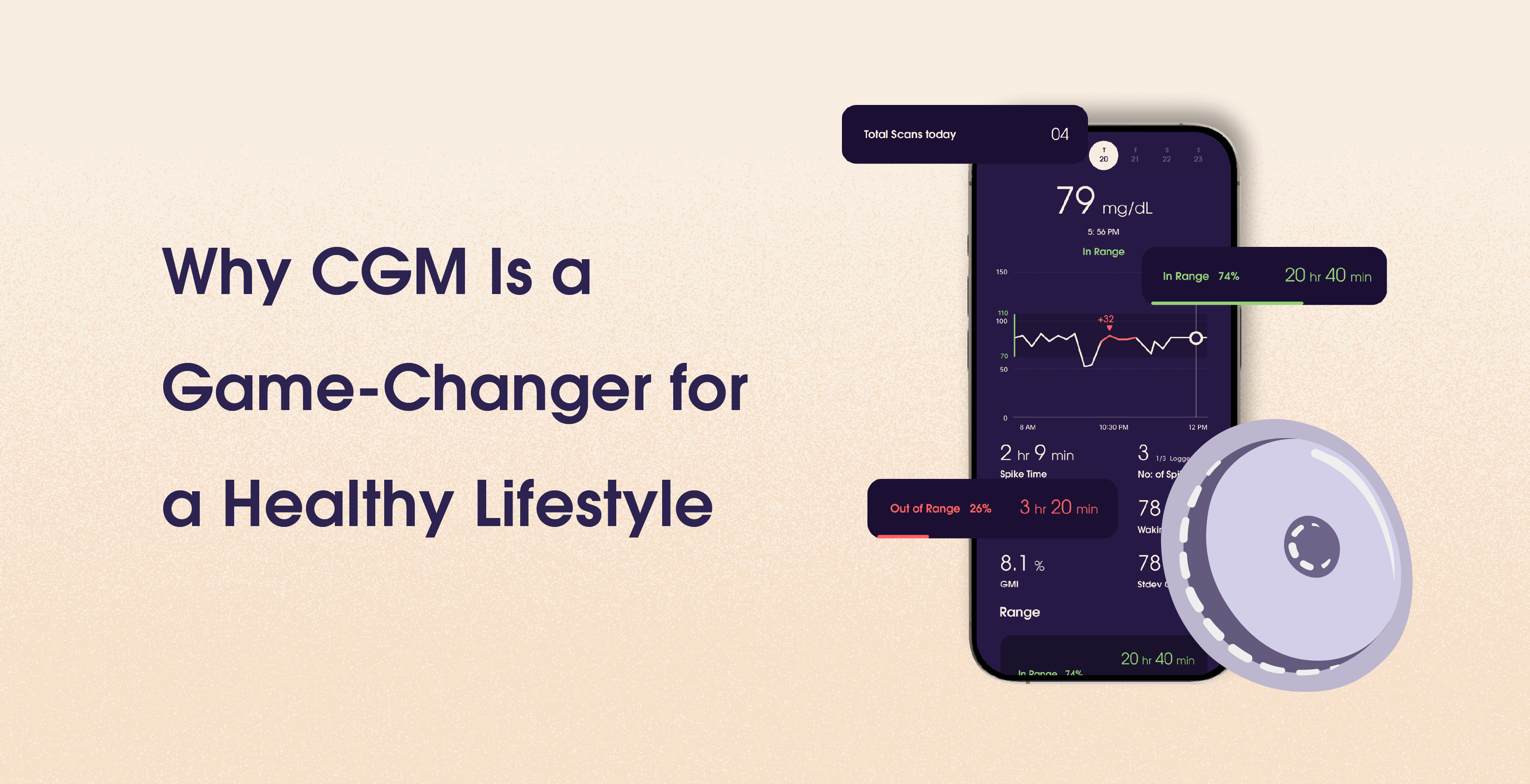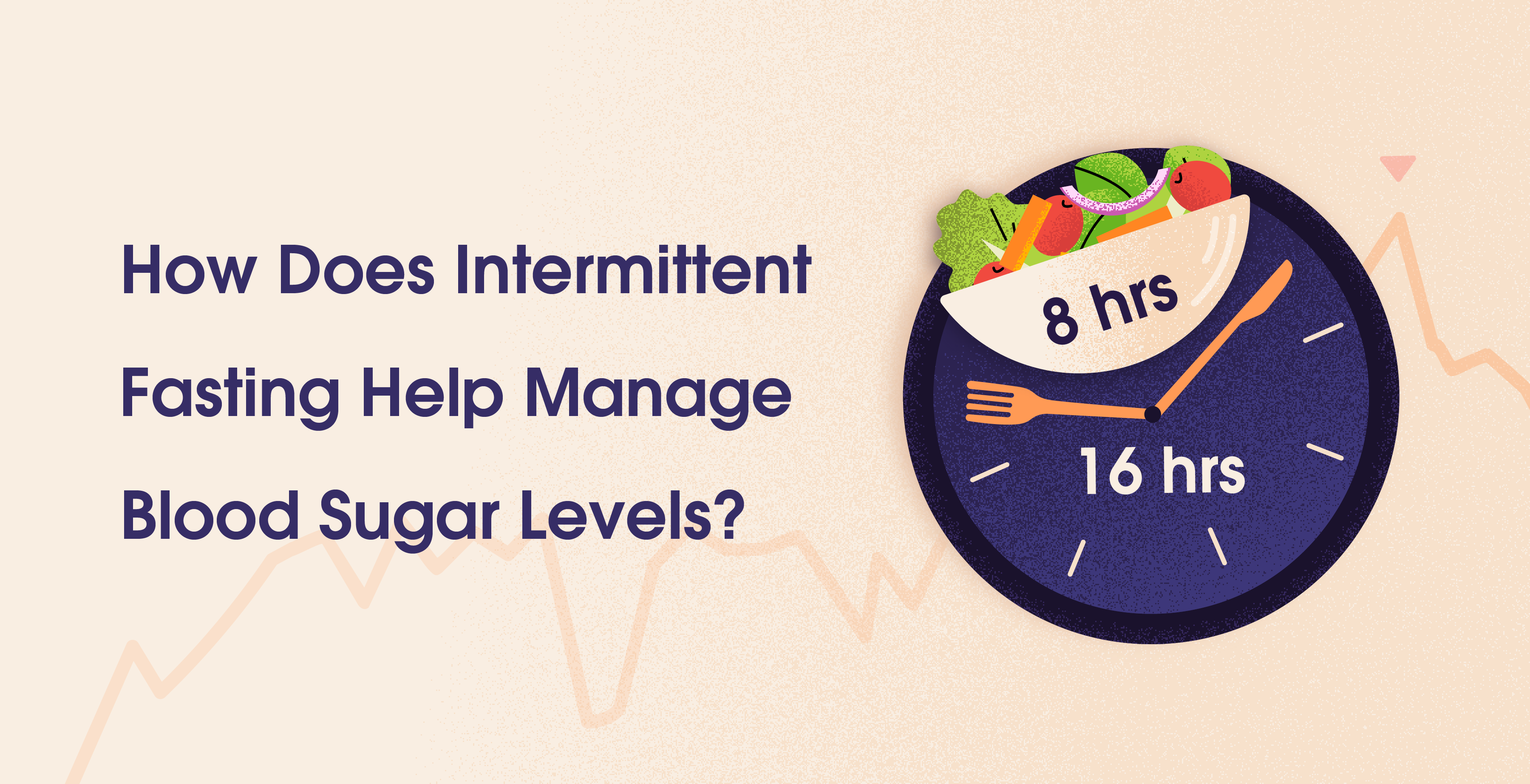Diet for Prediabetes in Females
Jan 13, 2024
Ashima Raizada



Table Of Contents
Glucose, high glucose more precisely, is the villain in town. Blood sugar, or glucose, naturally rises and falls during the day. However, erratic eating patterns can cause constant glucose spikes, quick rise followed by a rapid fall. These spikes also, over time, can result in serious health conditions like prediabetes, diabetes, and heart diseases. It gets even more complicated if you are woman, dealing with your hormonal cycles throughout the month. Fortunately, you can prevent the consequences of high blood sugar and control prediabetes with informed diet choices and decisions. So a diet for prediabetes in females has now become a major topic of discussion!This article is your guide to understanding why your diet plays a crucial role in controlling, mitigating, and even reversing the prediabetes situation. We look at the science behind how diet influences your blood sugar, and what you can do to bring it under control.
Highlights
Diet is a key factor in controlling, mitigating, and even reversing prediabetes, with a focus on managing blood glucose levels.
Hormonal fluctuations add an extra layer to the prediabetes puzzle for women, and dietary choices can be tailored to address these challenges.
A prediabetes-friendly diet for women includes fiber, lean proteins, healthy fats, time-restricted eating, mindful carbohydrates, and hydration.
Mindful meal planning, batch cooking, smart snacking, hydration strategies, and keeping a food journal can help you make changes to your diet.
Why is Diet The Key Factor When Dealing With High Blood Sugar
Nutrition plays a pivotal role in the battle against prediabetes and its potential reversal, acting as a potent method in regulating blood sugar levels and steering clear of the high blood sugar or glucose.
Here's the science: Blood sugar, commonly referred to as blood glucose, is the amount of glucose (a simple sugar that serves as the body's main energy source for cells) in the blood. Diet, physical exercise, and general metabolic health all have an impact on blood glucose levels, which are controlled by the hormones glucagon and insulin. Glucagon helps your liver break down the food you eat to make glucose.
Meanwhile, every bite you take influences your body's intricate relationship with insulin, the blood sugar carrier hormone in your body. High or low levels of blood sugar can, in the short term, have a direct effect on moods, emotions, and well-being. In the long term, these may lead to conditions like prediabetes and type 2 diabetes.
Additionally, for women, blood sugar levels may be unpredictable due to hormonal fluctuations that occur just before and throughout your menstrual cycle. Your periods can be heavier or longer, and food cravings might make diabetes management more difficult. Over time, you might identify a trend or discover that each era is unique.
All these factors make a balanced diet crucial for stable blood sugar levels, preventing spikes and crashes. When we eat, especially carbohydrates, the body converts them into glucose, the primary energy source. In well-balanced meals with a mix of nutrients, glucose absorption is gradual, thanks to fiber and complex carbohydrates. This ensures a steady release into the bloodstream, maintaining normal blood sugar levels.
But imbalanced meals, even if not “junk” food, can cause rapid spikes. Meals rich in simple carbohydrates, like refined grains or sugars, lead to a swift rise in blood glucose levels. Even seemingly wholesome options, like homemade rice lacking fiber and adequate carbs, contribute to quick glucose absorption, elevating blood sugar levels. Habitual consumption of such meals can contribute to conditions like prediabetes or type II diabetes.
Maintaining normal blood glucose involves more than avoiding sugary foods; it's about crafting well-balanced meals. A thoughtful nutrient combination influences glucose release, promoting overall health and reducing the risk of blood sugar-related disorders.
Why is Diet More Crucial For Women Dealing With Prediabetes
For women, hormonal fluctuations add an extra layer to the prediabetes puzzle. Dietary choices impact insulin sensitivity, and the right foods can help strike a harmonious chord with fluctuating hormones. Focusing on whole grains, lean proteins, and fiber-rich fruits and vegetables forms the foundation of a prediabetes-friendly diet.
In fact, according to Harvard- and MIT-trained women's health expert Sara Gottfried, MD women experience the damaging effects of elevated glucose at lower thresholds than men. She points out that blood sugar levels naturally rise at about age 50 as a result of menopausal hormone fluctuations in women.
Actually, according to a Brazilian study, 88% of postmenopausal women have poor metabolic patterns that affect how their bodies metabolize blood sugar. Additionally, in her book titled “Women, Food, and Hormones,” Dr. Gottfried offers advice to strive for appropriate blood sugar levels as it can help maintain vigorous health as one matures.
Think of it as a gentle nudge to your body's metabolism, saying “We've got this.” By incorporating smart food choices, you're not just fueling your body but also equipping it with the tools to manage blood sugar levels effectively. So, whether it's opting for complex carbs over refined sugars or embracing a rainbow of veggies, your nutritional choices can be the game-changer in the prediabetes playbook.
A Guide to Diet for Prediabetes in Females
Step into the realm of reclaiming your health, where we guide you through figuring out dietary changes you can make to overcome high blood sugar or glucose. Navigating the hormonal terrain while managing blood sugar levels demands a nuanced approach to nutrition. So, let's dive deep into the science-backed secrets that can be your allies in this transformative process.
Fiber
Not only does fiber fuel your body with essential nutrients, but it also plays a crucial role in stabilizing blood sugar levels. The Glucose Goddess, Jessie Inchauspe, for instance, recommends eating protein and fiber earlier in the day or first at each meal, since it can positively affect your blood glucose, satiety, and how much you will eat across the day.
In fact, Jesse recommends eating your food in a certain order (veggies first, then protein and fats, then starches and sugars). This can reduce the glucose spike of your meal by up to 75% compared to eating the foods randomly. Adding vegetables to the beginning of your meals ensures that the fiber in the veggies will coat your intestine and prevent the body from absorbing too much of the glucose crashing down afterward.(1)
For women dealing with uneven cycles and hormonal upheavals, a fiber-rich meal has the added advantage of the absorption of carbohydrates, leading to a gradual and steady release of glucose into the bloodstream. This mitigates the risk of abrupt blood sugar spikes. So include fiber-rich foods in your diet, such as whole grains, legumes, and a rainbow of vegetables.
Lean Proteins
Lean proteins aren't just muscle builders; they can be your blood sugar bodyguards too. Savor the goodnesss of poultry, fish, tofu, tempeh, and legumes. These proteins not only stabilize blood sugar levels but also provide a sustained feeling of fullness, reducing the temptation for unnecessary snacking. This is because lean proteins activate a hormone called glucagon, which assists in regulating blood sugar levels. It's a win-win on your prediabetes journey.
The most effective way to feel full on fewer calories is to replace some of your non-fiber carbohydrates with protein. In fact, after eating a high-protein meal, many people even experience a reduction in blood sugar, particularly if they do so early in the day when the Dawn Phenomenon causes their blood sugar levels to rise.
Healthy Fats
In an era where low-fat diets have taken center stage, the significance of essential, healthy fats has often been overlooked. The fear of fats has led many to disregard their crucial role in nutrient absorption and overall well-being. Contrary to popular belief, good fats, such as those found in avocados, nuts, and olive oil, play a pivotal role in supporting bodily functions, particularly in the context of insulin sensitivity and blood sugar management.
It's essential to recognize that fats are not the enemy but, in fact, valuable allies in maintaining a balanced diet. These healthy fats aid in the absorption of essential vitamins and nutrients from food, contributing to overall health. Dr. Mark Hyman is onto something when he advocates for healthy fats. Avocados, nuts, ghee, and olive oil are not just tasty additions; they contribute to improved insulin sensitivity.
Consuming a sufficient amount of omega-3 fats, olive oil, coconut butter, legumes, nuts, and seeds is not just about enjoying flavorful additions to your meals; it's about actively supporting your body's ability to respond effectively to insulin and manage blood sugar. Healthy fats promote insulin sensitivity, a crucial factor in avoiding or treating insulin resistance and prediabetes. By choosing these fats wisely, you not only enhance your heart health but also work towards achieving a balanced blood sugar level.
In essence, the aversion to fats, fueled by the low-fat diet trend, has obscured the fundamental role fats play in our overall health. Recognizing and incorporating these essential fats into our diets can contribute to improved insulin sensitivity, blood sugar balance, and the optimal absorption of vital nutrients.
Time-Restricted Eating: Syncing with Your Body's Rhythm
Time-restricted eating aligns with your body's circadian rhythm, optimizing the functioning of various metabolic processes, including those related to blood sugar control. This not only aids hormonal balance, especially for women, but also offers potential benefits for blood sugar control. By respecting your body's internal clock, you create an environment where it can function optimally.
Delving into the world of time-restricted eating, recent research sheds light on its potential impact on our bodies. The findings suggest that opting for a meal hiatus two to three hours before bedtime and waiting an additional hour after waking up could yield benefits. This concept of confining calorie intake to a specific timeframe, strategically separated from our daily sleep cycle, aligns with several health advantages, as indicated by a convergence of various observations in the study.
Mindful Carbohydrates: Choosing Wisely
After consuming your favorite comfort carb, that burger or pizza perhaps, your blood sugar soars, but after a few hours, it plummets, prompting you to go for another quick snack and start the entire cycle all over again. Of course, this cycle can result in weariness, weight gain, and cravings. Furthermore, over time, blood sugar surges itself may weaken our veins and reduce our life expectancy. Finally, it can result in insulin resistance, and prediabetes or diabetes.
For women, this becomes more complex as our monthly hormonal cycles directly affect glucose levels and may lead to carb cravings. To avoid these sudden spikes and crashes, mindful carbs are a must. Mindful carbohydrate choices, especially complex ones, provide a sustained source of energy and prevent the rapid rise in blood sugar levels.
So opt for complex carbohydrates found in whole grains, vegetables, and fruits. These choices provide a steady release of glucose, avoiding the rollercoaster effect of sudden spikes. It's not about avoiding carbs but choosing the right ones to maintain stable blood sugar levels.
Hydration
Water isn't just a basic necessity; it plays a crucial role in metabolic processes. Proper hydration supports overall well-being and can be particularly beneficial for those navigating prediabetes. Hydration, often overlooked, is intricately linked to metabolic function and can influence how your body handles glucose. Make water your beverage of choice, steering clear of sugary alternatives that can disrupt your body's natural balance.
Incorporating these dietary shifts isn't about restriction or counting calories; it's a mindful and sustainable approach to nourishing your body and managing blood sugar levels. Remember, these suggestions are your companions on the prediabetes journey, and consulting with healthcare professionals can provide personalized guidance.
Diet Hacks To Fight Prediabetes
Now that we've unveiled the essentials of a prediabetes-friendly diet, let's dive into practical hacks you can start with to bring down your blood sugar levels. Consider these guidelines as your roadmap to the seamless integration of these dietary principles into your daily life.
Mindful Meal Planning
Take a moment to strategize your meals, incorporating a balance of fiber-rich vegetables, lean proteins, and healthy fats. This not only streamlines your grocery shopping but ensures that you have the right ingredients at your fingertips.
Batch Cooking for Convenience
Simplify your life by embracing batch cooking. Spend a weekend afternoon preparing large batches of prediabetes-friendly meals. Portion them into containers and freeze them for quick and convenient access during busy weekdays. This not only saves time but ensures you always have a healthy option on hand.
Snack Smartly
Snacking doesn't have to be a guilty pleasure. Smart snacking with a combination of protein and fiber can be your go-to strategy. Think apple slices with almond butter or Greek yogurt with berries. These snacks keep you satisfied without wreaking havoc on your blood sugar.
Use Meal Sequencing To Eat Smart
Smart eating through meal sequencing doesn't require changing what you eat, just how you eat it. Incorporate different food groups to avoid sudden glucose spikes. Start with a favorite vegetable before every meal during the week. Pairing healthy proteins with carbs helps stabilize glucose levels. For a steady-glucose breakfast, prioritize protein like eggs, beans, or sausages, saving starches and sugars as optional additions. If you enjoy a sweet breakfast, begin with protein, fats, and fiber, like an egg or full-fat yogurt, before indulging in sweet foods like jam or granola. Mix other foods with sugars and starches to lessen their impact on blood sugar.
Stay Hydrated with Flair
Hydration doesn't have to be mundane. Infuse your water with slices of citrus fruits, cucumber, or mint for a refreshing twist. Staying hydrated is a simple yet powerful hack for supporting your overall well-being. Set an alarm if you need, to remember it is time to hydrate.
Drink Vinegar Before Meals
Drink a tablespoon of vinegar or apple cider vinegar in a glass of water, 20 minutes before eating. This can reduce those glucose spikes from your meals by 30%, according to the Glucose Goddess, Jesse Inchauspe.
Journal Your Journey
Consider keeping a food journal. Track your meals, noting how your body responds to different foods. This personalized record can be a valuable tool in understanding your unique dietary needs and making informed choices. (2) Remember, these hacks aren't about rigid rules but flexible tools to make your prediabetes-friendly journey enjoyable and sustainable. Experiment, find what works best for you, and let Urth be your companion in this transformative exploration of better health if you are looking for expert guidance.
Conclusion
In the realm of prediabetes, we have illuminated the path to better health through science-backed nutrition. Armed with insights from fiber-rich choices to time-restricted eating, women can navigate the complexities of hormonal influences. Practical hacks offer seamless integration into daily life, proving that managing prediabetes isn't a daunting task but a journey toward well-being. Embrace the wisdom, make it yours, and take this transformative expedition to balanced energy and lasting health.
References
Glucose, high glucose more precisely, is the villain in town. Blood sugar, or glucose, naturally rises and falls during the day. However, erratic eating patterns can cause constant glucose spikes, quick rise followed by a rapid fall. These spikes also, over time, can result in serious health conditions like prediabetes, diabetes, and heart diseases. It gets even more complicated if you are woman, dealing with your hormonal cycles throughout the month. Fortunately, you can prevent the consequences of high blood sugar and control prediabetes with informed diet choices and decisions. So a diet for prediabetes in females has now become a major topic of discussion!This article is your guide to understanding why your diet plays a crucial role in controlling, mitigating, and even reversing the prediabetes situation. We look at the science behind how diet influences your blood sugar, and what you can do to bring it under control.
Highlights
Diet is a key factor in controlling, mitigating, and even reversing prediabetes, with a focus on managing blood glucose levels.
Hormonal fluctuations add an extra layer to the prediabetes puzzle for women, and dietary choices can be tailored to address these challenges.
A prediabetes-friendly diet for women includes fiber, lean proteins, healthy fats, time-restricted eating, mindful carbohydrates, and hydration.
Mindful meal planning, batch cooking, smart snacking, hydration strategies, and keeping a food journal can help you make changes to your diet.
Why is Diet The Key Factor When Dealing With High Blood Sugar
Nutrition plays a pivotal role in the battle against prediabetes and its potential reversal, acting as a potent method in regulating blood sugar levels and steering clear of the high blood sugar or glucose.
Here's the science: Blood sugar, commonly referred to as blood glucose, is the amount of glucose (a simple sugar that serves as the body's main energy source for cells) in the blood. Diet, physical exercise, and general metabolic health all have an impact on blood glucose levels, which are controlled by the hormones glucagon and insulin. Glucagon helps your liver break down the food you eat to make glucose.
Meanwhile, every bite you take influences your body's intricate relationship with insulin, the blood sugar carrier hormone in your body. High or low levels of blood sugar can, in the short term, have a direct effect on moods, emotions, and well-being. In the long term, these may lead to conditions like prediabetes and type 2 diabetes.
Additionally, for women, blood sugar levels may be unpredictable due to hormonal fluctuations that occur just before and throughout your menstrual cycle. Your periods can be heavier or longer, and food cravings might make diabetes management more difficult. Over time, you might identify a trend or discover that each era is unique.
All these factors make a balanced diet crucial for stable blood sugar levels, preventing spikes and crashes. When we eat, especially carbohydrates, the body converts them into glucose, the primary energy source. In well-balanced meals with a mix of nutrients, glucose absorption is gradual, thanks to fiber and complex carbohydrates. This ensures a steady release into the bloodstream, maintaining normal blood sugar levels.
But imbalanced meals, even if not “junk” food, can cause rapid spikes. Meals rich in simple carbohydrates, like refined grains or sugars, lead to a swift rise in blood glucose levels. Even seemingly wholesome options, like homemade rice lacking fiber and adequate carbs, contribute to quick glucose absorption, elevating blood sugar levels. Habitual consumption of such meals can contribute to conditions like prediabetes or type II diabetes.
Maintaining normal blood glucose involves more than avoiding sugary foods; it's about crafting well-balanced meals. A thoughtful nutrient combination influences glucose release, promoting overall health and reducing the risk of blood sugar-related disorders.
Why is Diet More Crucial For Women Dealing With Prediabetes
For women, hormonal fluctuations add an extra layer to the prediabetes puzzle. Dietary choices impact insulin sensitivity, and the right foods can help strike a harmonious chord with fluctuating hormones. Focusing on whole grains, lean proteins, and fiber-rich fruits and vegetables forms the foundation of a prediabetes-friendly diet.
In fact, according to Harvard- and MIT-trained women's health expert Sara Gottfried, MD women experience the damaging effects of elevated glucose at lower thresholds than men. She points out that blood sugar levels naturally rise at about age 50 as a result of menopausal hormone fluctuations in women.
Actually, according to a Brazilian study, 88% of postmenopausal women have poor metabolic patterns that affect how their bodies metabolize blood sugar. Additionally, in her book titled “Women, Food, and Hormones,” Dr. Gottfried offers advice to strive for appropriate blood sugar levels as it can help maintain vigorous health as one matures.
Think of it as a gentle nudge to your body's metabolism, saying “We've got this.” By incorporating smart food choices, you're not just fueling your body but also equipping it with the tools to manage blood sugar levels effectively. So, whether it's opting for complex carbs over refined sugars or embracing a rainbow of veggies, your nutritional choices can be the game-changer in the prediabetes playbook.
A Guide to Diet for Prediabetes in Females
Step into the realm of reclaiming your health, where we guide you through figuring out dietary changes you can make to overcome high blood sugar or glucose. Navigating the hormonal terrain while managing blood sugar levels demands a nuanced approach to nutrition. So, let's dive deep into the science-backed secrets that can be your allies in this transformative process.
Fiber
Not only does fiber fuel your body with essential nutrients, but it also plays a crucial role in stabilizing blood sugar levels. The Glucose Goddess, Jessie Inchauspe, for instance, recommends eating protein and fiber earlier in the day or first at each meal, since it can positively affect your blood glucose, satiety, and how much you will eat across the day.
In fact, Jesse recommends eating your food in a certain order (veggies first, then protein and fats, then starches and sugars). This can reduce the glucose spike of your meal by up to 75% compared to eating the foods randomly. Adding vegetables to the beginning of your meals ensures that the fiber in the veggies will coat your intestine and prevent the body from absorbing too much of the glucose crashing down afterward.(1)
For women dealing with uneven cycles and hormonal upheavals, a fiber-rich meal has the added advantage of the absorption of carbohydrates, leading to a gradual and steady release of glucose into the bloodstream. This mitigates the risk of abrupt blood sugar spikes. So include fiber-rich foods in your diet, such as whole grains, legumes, and a rainbow of vegetables.
Lean Proteins
Lean proteins aren't just muscle builders; they can be your blood sugar bodyguards too. Savor the goodnesss of poultry, fish, tofu, tempeh, and legumes. These proteins not only stabilize blood sugar levels but also provide a sustained feeling of fullness, reducing the temptation for unnecessary snacking. This is because lean proteins activate a hormone called glucagon, which assists in regulating blood sugar levels. It's a win-win on your prediabetes journey.
The most effective way to feel full on fewer calories is to replace some of your non-fiber carbohydrates with protein. In fact, after eating a high-protein meal, many people even experience a reduction in blood sugar, particularly if they do so early in the day when the Dawn Phenomenon causes their blood sugar levels to rise.
Healthy Fats
In an era where low-fat diets have taken center stage, the significance of essential, healthy fats has often been overlooked. The fear of fats has led many to disregard their crucial role in nutrient absorption and overall well-being. Contrary to popular belief, good fats, such as those found in avocados, nuts, and olive oil, play a pivotal role in supporting bodily functions, particularly in the context of insulin sensitivity and blood sugar management.
It's essential to recognize that fats are not the enemy but, in fact, valuable allies in maintaining a balanced diet. These healthy fats aid in the absorption of essential vitamins and nutrients from food, contributing to overall health. Dr. Mark Hyman is onto something when he advocates for healthy fats. Avocados, nuts, ghee, and olive oil are not just tasty additions; they contribute to improved insulin sensitivity.
Consuming a sufficient amount of omega-3 fats, olive oil, coconut butter, legumes, nuts, and seeds is not just about enjoying flavorful additions to your meals; it's about actively supporting your body's ability to respond effectively to insulin and manage blood sugar. Healthy fats promote insulin sensitivity, a crucial factor in avoiding or treating insulin resistance and prediabetes. By choosing these fats wisely, you not only enhance your heart health but also work towards achieving a balanced blood sugar level.
In essence, the aversion to fats, fueled by the low-fat diet trend, has obscured the fundamental role fats play in our overall health. Recognizing and incorporating these essential fats into our diets can contribute to improved insulin sensitivity, blood sugar balance, and the optimal absorption of vital nutrients.
Time-Restricted Eating: Syncing with Your Body's Rhythm
Time-restricted eating aligns with your body's circadian rhythm, optimizing the functioning of various metabolic processes, including those related to blood sugar control. This not only aids hormonal balance, especially for women, but also offers potential benefits for blood sugar control. By respecting your body's internal clock, you create an environment where it can function optimally.
Delving into the world of time-restricted eating, recent research sheds light on its potential impact on our bodies. The findings suggest that opting for a meal hiatus two to three hours before bedtime and waiting an additional hour after waking up could yield benefits. This concept of confining calorie intake to a specific timeframe, strategically separated from our daily sleep cycle, aligns with several health advantages, as indicated by a convergence of various observations in the study.
Mindful Carbohydrates: Choosing Wisely
After consuming your favorite comfort carb, that burger or pizza perhaps, your blood sugar soars, but after a few hours, it plummets, prompting you to go for another quick snack and start the entire cycle all over again. Of course, this cycle can result in weariness, weight gain, and cravings. Furthermore, over time, blood sugar surges itself may weaken our veins and reduce our life expectancy. Finally, it can result in insulin resistance, and prediabetes or diabetes.
For women, this becomes more complex as our monthly hormonal cycles directly affect glucose levels and may lead to carb cravings. To avoid these sudden spikes and crashes, mindful carbs are a must. Mindful carbohydrate choices, especially complex ones, provide a sustained source of energy and prevent the rapid rise in blood sugar levels.
So opt for complex carbohydrates found in whole grains, vegetables, and fruits. These choices provide a steady release of glucose, avoiding the rollercoaster effect of sudden spikes. It's not about avoiding carbs but choosing the right ones to maintain stable blood sugar levels.
Hydration
Water isn't just a basic necessity; it plays a crucial role in metabolic processes. Proper hydration supports overall well-being and can be particularly beneficial for those navigating prediabetes. Hydration, often overlooked, is intricately linked to metabolic function and can influence how your body handles glucose. Make water your beverage of choice, steering clear of sugary alternatives that can disrupt your body's natural balance.
Incorporating these dietary shifts isn't about restriction or counting calories; it's a mindful and sustainable approach to nourishing your body and managing blood sugar levels. Remember, these suggestions are your companions on the prediabetes journey, and consulting with healthcare professionals can provide personalized guidance.
Diet Hacks To Fight Prediabetes
Now that we've unveiled the essentials of a prediabetes-friendly diet, let's dive into practical hacks you can start with to bring down your blood sugar levels. Consider these guidelines as your roadmap to the seamless integration of these dietary principles into your daily life.
Mindful Meal Planning
Take a moment to strategize your meals, incorporating a balance of fiber-rich vegetables, lean proteins, and healthy fats. This not only streamlines your grocery shopping but ensures that you have the right ingredients at your fingertips.
Batch Cooking for Convenience
Simplify your life by embracing batch cooking. Spend a weekend afternoon preparing large batches of prediabetes-friendly meals. Portion them into containers and freeze them for quick and convenient access during busy weekdays. This not only saves time but ensures you always have a healthy option on hand.
Snack Smartly
Snacking doesn't have to be a guilty pleasure. Smart snacking with a combination of protein and fiber can be your go-to strategy. Think apple slices with almond butter or Greek yogurt with berries. These snacks keep you satisfied without wreaking havoc on your blood sugar.
Use Meal Sequencing To Eat Smart
Smart eating through meal sequencing doesn't require changing what you eat, just how you eat it. Incorporate different food groups to avoid sudden glucose spikes. Start with a favorite vegetable before every meal during the week. Pairing healthy proteins with carbs helps stabilize glucose levels. For a steady-glucose breakfast, prioritize protein like eggs, beans, or sausages, saving starches and sugars as optional additions. If you enjoy a sweet breakfast, begin with protein, fats, and fiber, like an egg or full-fat yogurt, before indulging in sweet foods like jam or granola. Mix other foods with sugars and starches to lessen their impact on blood sugar.
Stay Hydrated with Flair
Hydration doesn't have to be mundane. Infuse your water with slices of citrus fruits, cucumber, or mint for a refreshing twist. Staying hydrated is a simple yet powerful hack for supporting your overall well-being. Set an alarm if you need, to remember it is time to hydrate.
Drink Vinegar Before Meals
Drink a tablespoon of vinegar or apple cider vinegar in a glass of water, 20 minutes before eating. This can reduce those glucose spikes from your meals by 30%, according to the Glucose Goddess, Jesse Inchauspe.
Journal Your Journey
Consider keeping a food journal. Track your meals, noting how your body responds to different foods. This personalized record can be a valuable tool in understanding your unique dietary needs and making informed choices. (2) Remember, these hacks aren't about rigid rules but flexible tools to make your prediabetes-friendly journey enjoyable and sustainable. Experiment, find what works best for you, and let Urth be your companion in this transformative exploration of better health if you are looking for expert guidance.
Conclusion
In the realm of prediabetes, we have illuminated the path to better health through science-backed nutrition. Armed with insights from fiber-rich choices to time-restricted eating, women can navigate the complexities of hormonal influences. Practical hacks offer seamless integration into daily life, proving that managing prediabetes isn't a daunting task but a journey toward well-being. Embrace the wisdom, make it yours, and take this transformative expedition to balanced energy and lasting health.
References
Table Of Contents
Table Of Contents
Table Of Contents
Read More


Mar 25, 2025
Sayfali Rawlani


Mar 20, 2025
Sayfali Rawlani


Mar 6, 2025
Sayfali Rawlani



Company
Copyright © 2025 trst health. All right reserved.

